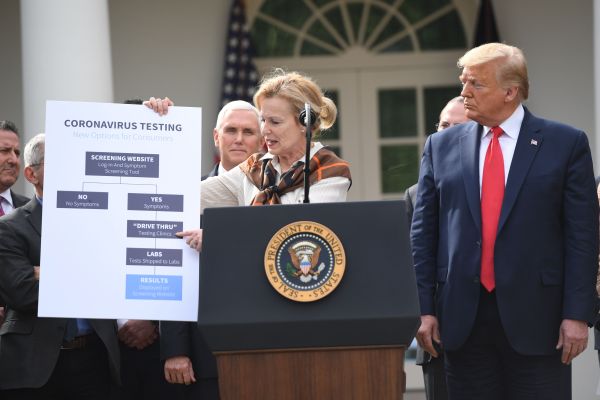Alphabet’s Verily launches its California COVID-19 test screening site in a limited pilot - 3 minutes read
 Alphabet -owned health technology company Verily has launched the COVID-19 screening site that was first misrepresented by President Trump as a broadly focused coronavirus web-based screening and testing utility developed by Google. After a flurry of blog posts by Google and Verily over the weekend, as well as a follow-up press conference by the White House, it became clear that the screening and testing site was a Verily project, limited in scope to California residents, with a specific focus on a couple of counties for now.
Alphabet -owned health technology company Verily has launched the COVID-19 screening site that was first misrepresented by President Trump as a broadly focused coronavirus web-based screening and testing utility developed by Google. After a flurry of blog posts by Google and Verily over the weekend, as well as a follow-up press conference by the White House, it became clear that the screening and testing site was a Verily project, limited in scope to California residents, with a specific focus on a couple of counties for now.That’s what launched on Monday morning (as eventually clarified by the White House) – a site hosted at Verity’s Project Baseline, which, until now, has acted as a portal connecting potential participants with medical research studies. The California COVID-19 risk screening and testing site provides screening and potential free testing to those who are eligible based on its criteria, which right now includes residents of Santa Clara County and San Mateo County.
In addition to being located in these places, eligible participants must also be 18 or older; a resident of the U.S.; able to speak and read English; and willing to sign a COVID-19 Public Health authorization form, according to the website. This form provides permission to Verity to collect a person’s information to be used for the screening process. Anyone looking to make use of the site must also either create a new Google account or connect their existing account in order to register.
Despite the requirement of a Google account, Verily says on its website FAQ that it “follows federal and state regulations governing the collection and use of an individual’s data,” and stores the information securely in an encrypted format. It does note that Verily staff will have direct information to identifying information about anyone who uses the site, and that information will be shared with health care professionals, lab personnel, and health officials, and that info could potentially be shared with Verily’s data technology provider partners, including Google.
The company specifically says that it will not share any info with any insurance or medical providers without direct consent, and that any information shared through the COVID-19 screening process will not be used for advertising.
What the website actually provides participants is a multi-question survey that determines initial eligibility, followed by a more in-depth questionnaire intended to asses a person’s risk relative to actually having contracted coronavirus, which is then used to determine whether to direct them to a mobile testing site where they’ll receive a nasal swab and, after “a few days” according to Verily, their test results.
Verily said in a blog post over the weekend that it is working with California Governor Gavin Newsom’s office on expanding availability of the tool to additional parts of the Bay Area and the state. The company hasn’t so far mentioned explicitly any plans to expand to other states, and when I posed the question via email I received an auto-response directing me to their blog post citing a high volume of inbound requests.
Source: TechCrunch
Powered by NewsAPI.org